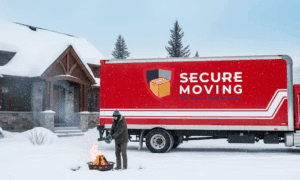Moving to a new home can be an exciting yet challenging experience. Between packing up your entire life and ensuring everything gets to the new location safely, there are plenty of opportunities for mistakes. Fortunately, many of the most common moving mishaps can be avoided with proper planning, organization, and the help of professional movers like Clockwork Moving.
In this article, we’ll explore some of the most frequent mistakes people make during a move and provide practical solutions to help you avoid these pitfalls. By following these tips, you can enjoy a smoother, more efficient, and stress-free move.
1. Underestimating the Time Needed to Move
One of the most common moving mistakes is underestimating how much time the entire process takes. From packing to cleaning, it often takes longer than anticipated to get everything done before moving day arrives.
a. Start Early to Avoid Last-Minute Panic
Many people wait until the last minute to start packing, assuming they can get it all done in a couple of days. This often leads to rushed packing, damaged items, and unnecessary stress. To avoid this mistake, start planning and packing weeks (or even months) in advance, especially if you have a large home or a lot of belongings.
Begin by packing non-essential items that you won’t need until after the move, such as seasonal clothing, books, or decorations. As moving day approaches, pack up your essential items and create a separate “essentials” box for things you’ll need immediately upon arriving at your new home.
b. Create a Moving Timeline
Developing a moving timeline can help keep you on track. Break down tasks by day or week, such as scheduling movers, packing specific rooms, and arranging utilities. Having a clear schedule ensures you’re not cramming everything into the last few days, which can lead to disorganization and stress.
2. Not Hiring Professional Movers
Some people believe they can save money by handling the entire move themselves, but this is often a costly mistake. Moving involves heavy lifting, careful planning, and knowledge of how to load a truck properly to avoid damage. Without the help of professional movers, the risk of injury, property damage, and stress increases.To transport your vehicle safely during a move, obtaining car shipping quotes is essential to compare costs and services.
a. The Advantages of Professional Movers
Hiring professional movers like Clockwork Moving offers several benefits. Experienced movers know how to handle your belongings with care, ensuring everything is packed and transported safely. They also have the right equipment to move heavy items like furniture or appliances, reducing the risk of damage to both your items and your home.
In addition to reducing the physical strain of moving, hiring professionals also saves time. Local movers are familiar with the area and know how to plan routes efficiently, which can prevent delays on moving day.
b. Assessing Moving Costs
While it may seem cheaper to rent a truck and handle the move yourself, the costs can add up quickly. Rental fees, fuel costs, moving supplies, and time off work can make DIY moving more expensive than hiring professionals. By getting quotes from reputable moving companies, you can compare the true cost of both options and make an informed decision.
3. Failing to Declutter Before the Move
Another common moving mistake is bringing too many unnecessary items to your new home. Moving everything, even items you no longer use, increases the cost and effort of the move. Decluttering before packing allows you to start fresh and reduces the amount of stuff you need to transport.
a. Declutter Room by Room
Decluttering can feel like a daunting task, but breaking it down into manageable steps makes it easier. Go through each room in your home, deciding which items you want to keep, donate, sell, or throw away. By getting rid of things you no longer need, you’ll have fewer items to pack and a lighter load for your movers.
Additionally, decluttering before the move allows you to better organize your new home. When you only bring the items that you truly want or need, it’s easier to arrange your new space in a way that feels clean and uncluttered from the start.
b. Be Realistic About What You Keep
It’s easy to become sentimental about belongings, but moving is a perfect opportunity to be honest about what you really need. If you haven’t used something in the past year, chances are you can live without it. Donating or selling items you no longer use not only lightens your load but also helps others.
4. Forgetting to Label Boxes
Packing all your belongings into boxes is one thing, but failing to label those boxes is a recipe for confusion and frustration when you arrive at your new home. Without proper labeling, you won’t know where anything is, which can turn unpacking into a chaotic and time-consuming task.
a. Use Detailed Labels
When packing, make sure to label each box with its contents and the room it belongs to. Instead of simply writing “Kitchen,” be more specific: “Kitchen – Plates, Cups, Glasses.” This extra detail helps you find specific items more easily when unpacking, especially if you need to prioritize certain boxes.
Using a color-coded labeling system can also be helpful. Assign each room in your new home a different color, and use matching labels or colored tape to indicate which boxes belong in which room. This allows the movers to place boxes directly in the appropriate rooms during unloading.
b. Create an Inventory
In addition to labeling, consider creating a box inventory to keep track of everything you’re moving. Number each box and make a list of the contents inside. This makes it easier to find what you need after the move and helps ensure that nothing gets lost during transit.
5. Overlooking Important Documents and Essentials
In the chaos of packing, it’s easy to forget about important documents, keys, and other essentials that you’ll need during or immediately after the move. Packing these items in a separate, clearly labeled box ensures that you have easy access to them when needed.
a. Pack an Essentials Box
Create a box or bag filled with essential items that you’ll need during the first few days in your new home. This should include personal items like toiletries, medications, chargers, important documents (such as IDs, insurance papers, and lease agreements), and basic kitchen supplies.
By packing an essentials box, you won’t have to frantically search through multiple boxes to find what you need during the first few nights in your new space. Keep this box with you rather than loading it onto the moving truck so it’s easily accessible.
b. Keep Important Documents Safe
Make sure important documents, such as birth certificates, passports, medical records, and financial papers, are stored in a safe, easily accessible location. You might want to carry these items with you personally rather than placing them in the moving truck. This prevents the risk of losing critical documents during the move.
6. Forgetting to Notify Utilities and Change Your Address
One of the most frequently overlooked aspects of moving is updating your address and transferring utilities. Forgetting to take care of this can lead to service interruptions and missed mail after you’ve moved into your new home.
a. Transfer Utilities in Advance
Contact your utility providers (electricity, gas, water, internet, etc.) at least two weeks before your move to transfer services to your new address. Schedule shut-off and turn-on dates for your old and new homes, ensuring there’s no gap in service. This way, you’ll arrive at your new place with all your essential utilities up and running.
b. Change Your Address
Update your address with the postal service, banks, insurance providers, and any subscription services before you move. Set up mail forwarding through your local post office to ensure you don’t miss any important mail during the transition. Notifying these organizations in advance helps avoid any disruptions in service or communication.
7. Not Planning for the Day of the Move
On the day of the move, things can quickly become hectic if you don’t have a solid plan in place. Proper preparation for moving day ensures that the process runs smoothly and minimizes stress.
a. Prepare Your Home for Movers
Before the movers arrive, make sure your home is prepared. Clear pathways, remove any obstacles, and keep pets or small children in a safe space away from the moving activity. This helps the movers do their job efficiently and reduces the risk of accidents or injuries.
b. Have a Plan for the Unload
When you arrive at your new home, have a plan for where the movers should place your boxes and furniture. Knowing where everything goes will help streamline the unloading process and make unpacking easier. As the movers bring in your belongings, check items off your inventory to ensure everything has arrived safely.
Conclusion
Moving can be a daunting task, but avoiding these common mistakes will make the process much smoother and more efficient. By starting early, hiring professional movers like Clockwork Moving, decluttering, labeling boxes, and staying organized, you can ensure a stress-free move. With the right planning and preparation, you’ll be able to settle into your new home with ease and enjoy the excitement of a fresh start.
Read More From Techbullion



































